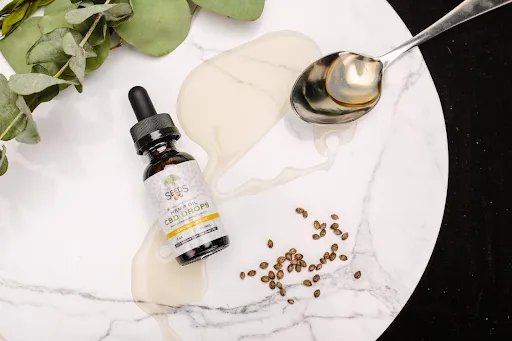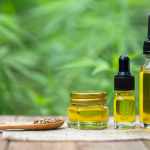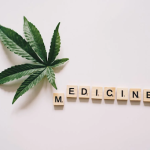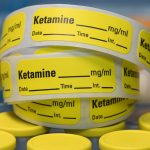Cannabidiol, or CBD, is one of multiple cannabinoid compounds found in the cannabis plant — the species that includes hemp and marijuana. CBD is usually isolated in tinctures or edibles and promotes a sense of well-being and relaxation. Unlike THC, the psychoactive cannabinoid found in marijuana, CBD doesn’t cause a “high” but offers an array of health and wellness benefits.
While CBD has been used for centuries as a natural medicine, modern science is only now confirming its potential to treat a variety of conditions, including anxiety, depression, epilepsy, and some forms of chronic pain. CBD is gaining popularity as a natural treatment method for common forms of anxiety because it helps manage symptoms without causing significant side effects.
This article covers CBD’s legal status, effect on the brain, benefits, forms of consumption, and potential risks. A fuller understanding of CBD as a naturalistic treatment can help you make a more informed decision about whether or not CBD products could be right for you.
Table of Contents
Is CBD Legal?
The 2018 Farm Bill removed hemp as a substance that falls under the Controlled Substances Act. Due to this legislation, CBD products with less than 0.3% THC are legal at the federal level as long as they are derived from hemp and not marijuana. All 50 states have legalized CBD products in some form, though each state sets its own rules for CBD products depending on the concentration of THC, FDA approval status, and source (hemp or marijuana).
Certain states, including Texas, Mississippi, and South Carolina, allow for higher concentrations of THC in medical CBD products. The process for obtaining a license for medical use varies by state, but usually involves getting a prescription from a licensed physician, submitting proof of residency, and completing an application to register as a medical cannabis patient with the state.
How Does CBD Affect the Brain?
CBD binds with cannabinoid receptors as well as GABA receptors in the brain. While THC also binds with cannabinoid receptors, CBD acts on them in a much more subtle way than THC and doesn’t cause changes in perception or thought patterns. Legal CBD products commonly contain less than 0.3% THC and aren’t associated with hallucinogenic properties.
When CBD binds to GABA receptors, it acts as a neurological anticonvulsant to treat epilepsy and seizures. For this reason, the FDA approved a cannabis-derived CBD product to treat epilepsy in children in 2018. Ongoing research shows some promise in using CBD products to replace benzodiazepine medications for patients who are resistant.
CBD helps with anxiety by supporting healthy levels of serotonin in the brain, a neurotransmitter responsible for mood regulation and proper sleep. One of the primary mechanisms for doing so involves tryptophan, an important precursor for serotonin production. CBD has been shown to raise the base tryptophan levels throughout the brain, allowing the brain to more easily maintain healthy serotonin levels.
CBD Benefits for Anxiety
Due to the rise in popularity of legal marijuana and hemp-based products, science has started examining the role of CBD in treating anxiety and depression, two of the most common psychiatric conditions. Because CBD is responsible for boosting mental calmness and promoting the generation of natural serotonin in the brain, it has proven effective for patients who suffer from several forms of anxiety.
Generalized Anxiety Disorder
Generalized Anxiety Disorder (GAD) causes feelings of nervousness or worry that are persistent or severe enough to disturb daily life. GAD is often a co-occurring condition, meaning those who suffer from it also have a high risk of depression, other forms of anxiety, and substance use disorders.
Recent studies have shown that CBD can help with GAD by bonding with the cannabinoid type 1 receptors in the brain to manage fears and anxiety-related behaviors. Study participants experienced an improvement in their symptoms with as little as 25 mg of CBD per day.
Social Anxiety Disorder
Social Anxiety Disorder (SAD) resembles GAD in many ways, but is triggered by an irrational fear of being judged or scrutinized by others in social situations. Like GAD, SAD often requires a combination of medication and cognitive or behavioral therapy.
Because SAD often exhibits itself in certain situations, those who suffer from it may find relief by taking fast-acting forms of CBD on an as-needed basis, i.e., immediately before or during a social situation.
Panic Disorder
Panic Disorder is a more severe form of anxiety that results in panic attacks. These attacks can arise with or without environmental triggers, and typically involve intense feelings of worry or helplessness, heart palpitations, difficulty breathing, sweating, and shaking.
CBD helps with panic disorder by regulating how the brain processes stressful situations. In addition, CBD’s anti-inflammatory properties help ease the physical symptoms of a panic attack, such as trouble breathing and heart palpitations. Those who have Panic Disorder are recommended to start with a higher dose of CBD to manage symptoms, roughly 66 mg per day.
How to Consume CBD
CBD products come in a variety of forms, including edible gummies, sublingual drops, tinctures, capsules, and oils. Certain health food stores may also sell teas and soft drink products containing CBD, depending on state laws. Dispensaries and online retailers sell cannabis-based products that contain a mixture of THC and CBD, though purchasing these products may require a medical license depending on state laws.
Proper dosage will vary depending on the person’s body size and symptoms, but it’s best to start at a low dose (20–40 mg) and work up. Gummies and edibles commonly contain 20 mg per serving, while oils and tinctures contain roughly 5 mg per drop. Consuming CBD orally results in a longer-lasting effect, while vaping CBD oil provides more immediate relief from symptoms.
Online retailers and suppliers, such as California weed delivery services, carry a variety of CBD edibles and tinctures for delivery within the state. By law, all products must clearly label the concentration of CBD, THC, and other active cannabinoids.
CBD Risks and Side Effects
CBD products are safe to use for most people and are responsible for minimal, if any, side effects. While the effects may vary with the type of product and the presence of other cannabinoids such as THC, CBD isolate (the purest form of CBD, containing 0% THC) will have the lowest risk of unwanted side effects.
Studies have shown that people can tolerate up to 1,500 mg of CBD per day, though much lower doses of 300–600 mg can be effective in reducing symptoms of anxiety.
Side effects from Epidiolex, an FDA-approved medication containing 99%+ CBD, might include:
Drowsiness
- Diarrhea
- Fatigue
- Dry mouth
- Decreased appetite
According to the FDA, Epidiolex can result in mild liver damage over time for some patients. CBD products may also interfere with certain blood thinners (such as Coumadin) as well as other prescription antidepressants, benzodiazepines, antihistamines, opioids, and antipsychotics.
The FDA doesn’t regulate CBD products for use when treating anxiety. Patients should consult with a licensed physician before deciding to use CBD products as a treatment for anxiety symptoms, and only purchase CBD products with clearly labeled ingredients from verified manufacturers.
Reclaim Your Calm with CBD
CBD has been hailed as a miracle medicine in recent years due to its potential to treat a variety of conditions naturally and with little to no side effects. Most CBD products are derived from the hemp plant and contain only trace amounts of THC, making them legal for consumption throughout the US. In its purest form, CBD can induce relaxation and a feeling of well-being without the psychoactive high that comes from THC in marijuana.
Products containing CBD have shown tremendous promise in treating people who suffer from different forms of anxiety. CBD represents a low-risk, high-return option for those who suffer from symptoms of anxiety because CBD is natural, non-intoxicating, and has a low risk of causing negative side effects.
While CBD products can be legally consumed in many states without requiring permission from a doctor, it’s always best to consult with a healthcare professional if you intend to explore CBD as a treatment option while taking other medications.








